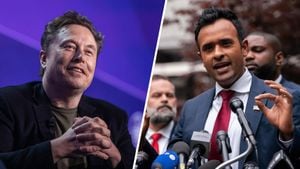President-elect Donald Trump is reportedly poised to appoint Senator Marco Rubio of Florida as his Secretary of State, according to several reports, including one from The New York Times. While this news has already made waves, it also highlights the unique dynamics present within Trump’s inner circle as he puts together his cabinet for his anticipated second term.
Sources familiar with Trump’s decision-making have indicated he has settled on Rubio, though some caution remains, as the final choice could still shift. This nomination, if confirmed, would mark a significant moment, as Rubio would become the first Latino to hold the Secretary of State position.
Throughout his political career, Rubio has gained recognition as a foreign policy hawk, making him a fitting candidate for this high-profile role. Trump has had a somewhat complex relationship with Rubio. The two were once rivals during the 2016 Republican primaries, known for their personal barbs and fierce debate exchanges—Rubio famously jabbed at Trump’s hands, questioning the meaning of their size.
Despite their previous clashes, Rubio is now considered one of Trump’s key allies. Their relationship has noticeably improved over the years, especially after Rubio chose to endorse Trump following the primaries. His endorsement not only solidified Rubio’s position within the Republican fold but also positioned him favorably as Trump looked toward building his cabinet.
Trump's cabinet formation is taking shape and reflects his priorities as he transitions back to the Oval Office. Alongside Rubio, reports suggest other notable appointments are on the way. Trump is expected to name Representative Mike Waltz (R-Fla.) as his National Security Advisor. Waltz, like Rubio, has encountered the international arena as part of his political career and will likely bring significant experience to his new role.
Rubio's voting record and statements on foreign affairs reveal much about his stance on international relations. For example, he voted against substantial aid to Ukraine earlier this year. This vote highlighted his belief in negotiating peace, even if such negotiations come at the cost of ceding territory to Russia. His hawkish tendencies are particularly evident when it involves issues with China and Cuba, where he has consistently advocated for tougher stances.
Many Republican leaders have already expressed their support for Rubio as Secretary of State. Senator Rick Scott of Florida was among the first to laud the potential nomination. "He will restore American leadership around the world, especially in Latin America, as he will represent the United States with dignity and courage!" Scott wrote on social media.
More than just the appointments of individuals like Rubio and Waltz, Trump's cabinet will once again reflect his distinct approach to governance—one marked by loyalty to his allies and continuity of his foreign policy doctrine. This approach was evident during Trump’s first term and is expected to continue as he grapples with various global challenges moving forward.
Speculation about Rubio’s cabinet position has sparked discussions about the immediate impact on U.S. foreign policy, particularly with Latin America where Rubio has held longstanding interests. Advocates of his appointment suggest he could effectively engage with countries across the region, fostering relations more aligned with Trump's agenda.
All this cabinet news creates anticipation—not just for Trump's supporters, but also for international observers who are closely watching how Trump’s policies and personnel will shape diplomatic relations once again. Should Rubio's nomination be finalized, expect to see swift reactions both domestically and abroad.
Meanwhile, as he works on assembling his team, Trump has other appointments to finalize. According to reports from multiple outlets, South Dakota Governor Kristi Noem is also expected to take on the important role of Homeland Security Secretary. Like Rubio, Noem has been vocal about her support of Trump’s policies, positioning her well for this influential cabinet position.
One must also keep an eye on the Senate as some of these potential appointments will lead to vacancies, necessitating special elections or appointments by the governors of the respective states. Should Rubio step down from his Senate seat, Florida Governor Ron DeSantis would have the power to nominate his successor until the 2026 midterm elections.
This wave of appointments demonstrates Trump’s intention to solidify his policy priorities and surround himself with familiar figures as he prepares for new challenges. The groundwork for the upcoming term is undoubtedly being laid, with each nomination likely to push America’s international policies and political climate forward.
The Trump administration’s response to international affairs will likely continue to make headlines as it explores shifts under new leadership, particularly with seasoned politicians like Rubio and Waltz joining the fold. Only time will tell how these dynamics play out, but they certainly promise to add significant interest to the political discourse as Trump’s second term approaches.



